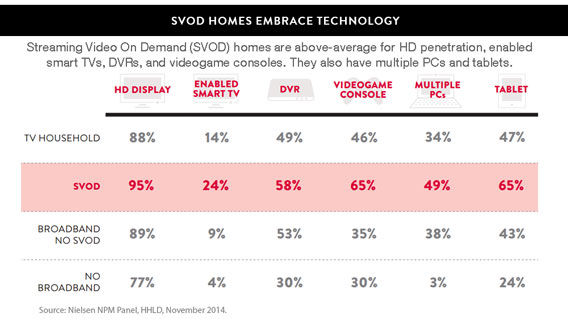Sony, Vox Media and Showtime all announced on Wednesday that they would be joining the rush to provide streaming video on demand in some fashion or another. Their moves follow HBO’s announcement this week that it will finally launch its standalone HBO Now video streaming service in an exclusive partnership with Apple — for the first time, allowing customers to watch HBO shows without paying for a traditional cable package.
Make no mistake, the scales have tipped. Even old school media heads have ceded that streaming is the future of video. “Clearly the bundle is changing. The days of the 500-channel universe are over,” CBS chief Les Moonves said Wednesday at an investor conference. “The days of the 150-channel universe in the home are not necessarily over but they’re changing rapidly. People are slicing it and dicing it in different ways.”
Related: Will Smith and the Death of Hollywood’s Box Office Superstars
As that slicing and dicing accelerates, the scramble for the crown in that streaming space is now turning into the battle for the Iron Throne. More and more contenders keep entering the fray. More players are joining the content production game, too, as owning a sizable back catalog has taken a backseat to generating original hits. New content — and in particular, new content with buzz — has become king. As shows like the adored and adorable Broad City or Drunk History — both of which started as web series and are now on Comedy Central — have proven, the barrier to entry as a content creator is lower than it has ever been.
As shows like the adored and adorable Broad City or Drunk History have proven, the barrier to entry as a content creator is lower than it has ever been.
So how do these new players stack up?
Showtime said it would push out its own version of an HBO Now-style, direct-to-consumer service… at some point “in the not-too-distant future.” For Showtime, this is obviously an attempt to compete with the massive popularity of HBO Go, the app that went a long way toward breaking down HBO’s old cable paywall, and HBO Now, which launched with the benefit of Apple’s public relations glitz. Though Showtime does not have the same number of zeitgeist-defining shows as its key rival, it has had a fair amount of critical and commercial success through the past decade with shows like Homeland, Dexter, Californication, Masters of Sex and Shameless.
Vox, with its plan to produce original video content, seems to be trying to ape the success of Vice Media, the video news company that, as of late last year, had a valuation around $2.5 billion to go with its ambitious IPO plans. Despite its immense and rapid success, Vox is still primarily a web based entity, dealing with the ever diminishing returns of the revenue-for-page-views model. Video content is both where the advertising dollars and the eyeballs are.
Related: Oscars 2015: The Nominees’ Worst Films
Sony’s announcement, on the other hand, was both the least surprising and the least clear. For almost a decade, Sony has been using its gaming devices as streaming boxes for services like Netflix, Hulu, Amazon Prime and HBO Go. Sony lost the television wars to Samsung, the movie wars to Disney and the dignity wars to hackers who may or may not have been North Korean. It needed to do something. The rumor that Sony was developing its own streaming service, PlayStation Vue, had been floating around for the better part of a year, and the move seemed like a no-brainer.
Sony lost the television wars to Samsung, the movie wars to Disney and the dignity wars to hackers who may or may not have been North Korean.
Rather than introducing a full slate of original content for its streaming service, Sony announced that it would partner with existing networks owned by CBC Corp, Viacom, Comcast, NBC Universal and 21st Century Fox. One significant holdout: Walt Disney, and its ESPN channels. Live sports, and the lack of quality streaming options for watching games, have been one important factor preventing more cable subscribers from cutting the cord.
Sony is gambling that its PlayStation 4 can stand out from all the other streaming media devices out there. It has sold more than 20 million PS4 consoles since its launch in 2013, and is expecting the console to go on sale in China shortly. PlayStation Vue will be available on the PlayStation 3 and a version of the app for Apple products will also help its viability. Sony’s first attempt to create original programming to draw in subscribers launched this week in the form of a comic-book adaptation called Powers, which has gotten somewhat underwhelming reviews. Sony had to start somewhere, but it may already be too late to the game.
Related: Netflix Isn't Joking Around with Its Adam Sandler Deal
What seems most problematic about Sony’s set up is that, while it does provide the escape from the traditional cable package that has been a thorn in the side of cord-cutters for so long, it is essentially repackaging the same material in a new skin. Sony is essentially offering a cheaper alternative to the standard cable package, giving viewers access to channels such as MTV, CMT, BET and Nickelodeon. Increasingly, though, these channels have evolved to become part of the downside of a cable subscription — the networks that add to your monthly bills but don’t offer much reason for large audiences to tune in.
The complaint that MTV sucks is so old that it could walk into a bar without being carded.
Take MTV, for instance. The complaint that MTV sucks is so old that it could walk into a bar without being carded, but now that the network has evolved (several times) from its music video days, no one’s exactly clear what it is anymore. Even current complaints about its programming seem to be referencing an MTV that hasn’t existed in half a decade. Put simply, who watches MTV? And who would pay for that content on a standalone basis? Of the Viacom offerings, only Comedy Central (which has just lost Stephen Colbert and shortly will lose Jon Stewart) continues to produce buzzworthy products.
Even the ostensibly highbrow networks long ago shed their purpose, and audience, in exchange for cheap reality content that can drive ratings in the short term. Nonstop Shark Week and 24 hours of Pawn Stars have driven all of the meaning out of The History Channel and Discovery in the same way that Music is no longer the “M” in MTV. Even BBC America has become dedicated to constant airings of Top Gear.
These are the products of an infrastructure that used to (barely) support the 500 channel framework. With slashed production budgets, declining ratings and ever fewer advertising dollars pouring in, it would make more sense to put these properties out of their misery than attempt to bring them into the streaming age.

Top Reads from The Fiscal Times:




